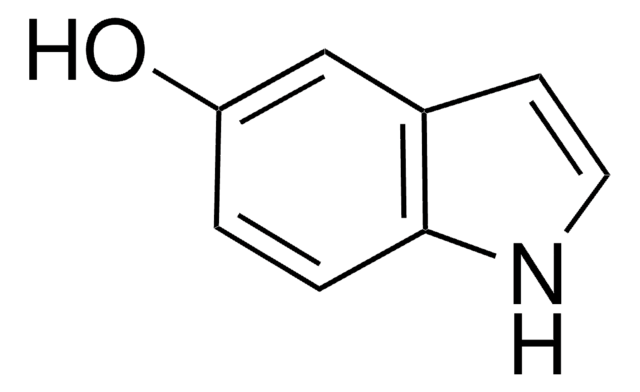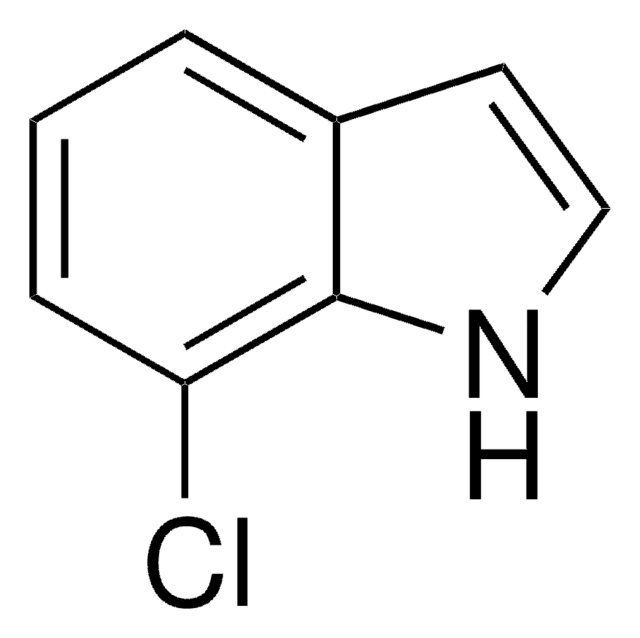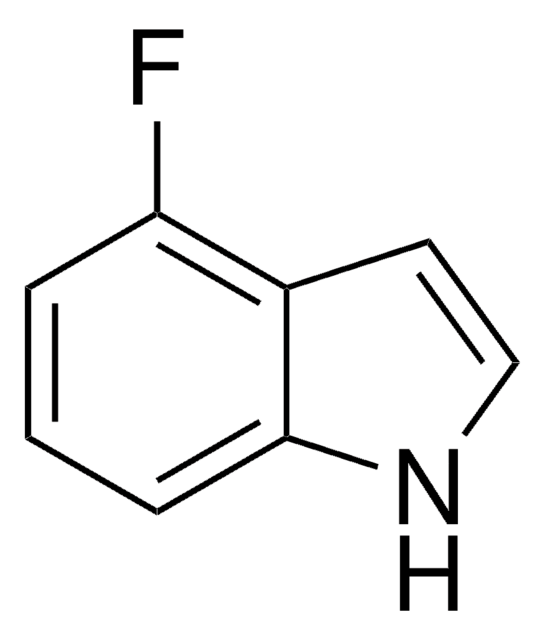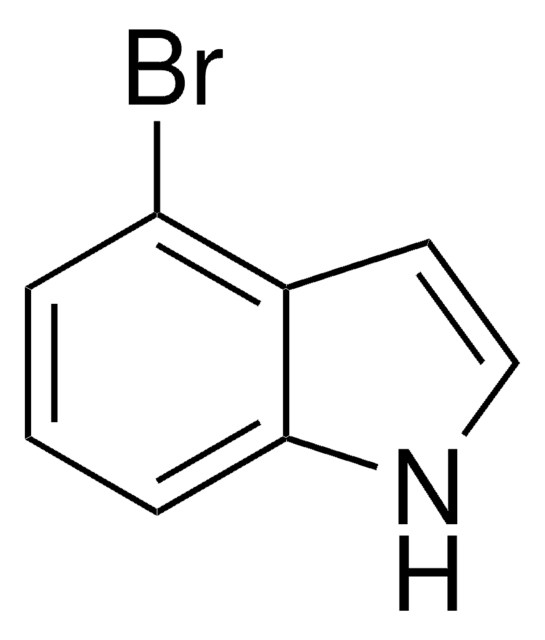All Photos(1)
About This Item
Empirical Formula (Hill Notation):
C8H6ClN
CAS Number:
Molecular Weight:
151.59
Beilstein:
2651
EC Number:
MDL number:
UNSPSC Code:
12352100
PubChem Substance ID:
NACRES:
NA.22
Recommended Products
Assay
98%
form
crystals
mp
69-71 °C (lit.)
SMILES string
Clc1ccc2[nH]ccc2c1
InChI
1S/C8H6ClN/c9-7-1-2-8-6(5-7)3-4-10-8/h1-5,10H
InChI key
MYTGFBZJLDLWQG-UHFFFAOYSA-N
Looking for similar products? Visit Product Comparison Guide
General description
5-Chloroindole can be synthesized by using 3-chlorobenzaldehyde as starting reagent.
5-Chloroindole is a 5-substituted indole. It undergoes electropolymerization to form a redox-active film consisting of a cyclic trimer and chains of linked cyclic trimer (polymer). It is a potential positive allosteric modulator (PAM) of the 5-HT3 receptor. It has been reported as strong inhibitor of the copper dissolution in acidic sodium chloride solution. It has been tested as corrosion inhibitor of mild steel in 1N deaerated sulphuric acid. Synthesis of 5-chloroindole, via nitration of indoline has been described.
Application
5-Chloroindole has been used in the synthesis of 5-chloro-3-indole-N,N- dimethylglyoxalamide and 5-chloro-N,N-dimethyltryptamine. It may be used in the synthesis of dyestuffs in the presence of biocatalysts (Escherichia coli expressing multicomponent phenol hydroxylase (mPH) isolated from Pseudomonas sp. strains KL33 and KL28).
5-Chloroindole has been used to study the biotransformation of substituted indoles to indican derivatives in the tissue cultures of Polygonum tinctorium. It may be employed as a monomer in the preparation of redox-active film made up of a cyclic trimer and chains of linked cyclic trimer (polymer).
Storage Class Code
11 - Combustible Solids
WGK
WGK 3
Flash Point(F)
Not applicable
Flash Point(C)
Not applicable
Personal Protective Equipment
dust mask type N95 (US), Eyeshields, Gloves
Certificates of Analysis (COA)
Search for Certificates of Analysis (COA) by entering the products Lot/Batch Number. Lot and Batch Numbers can be found on a product’s label following the words ‘Lot’ or ‘Batch’.
Already Own This Product?
Find documentation for the products that you have recently purchased in the Document Library.
Customers Also Viewed
Fluorescence properties of electropolymerised 5-substituted indoles in solution.
Jennings P, et al.
J. Chem. Soc., Faraday Trans., 94(24), 3619-3624 (1998)
Xiaoxue Tong et al.
Microbial cell factories, 15(1), 180-180 (2016-10-23)
Engineering of single-species biofilms for enzymatic generation of fine chemicals is attractive. We have recently demonstrated the utility of an engineered Escherichia coli biofilm as a platform for synthesis of 5-halotryptophan. E. coli PHL644, expressing a recombinant tryptophan synthase, was
Indigo and indirubin derivatives from indoles in Polygonum tinctorium tissue cultures.
Shim JY, et al.
Biotechnology Letters, 20(12), 1139-1143 (1998)
5-Amino-and 5-chloro-indole as mild steel corrosion inhibitors in 1 N sulphuric acid.
Moretti G, et al.
Electrochimica Acta, 41(13), 1971-1980 (1996)
Amy S Newman et al.
British journal of pharmacology, 169(6), 1228-1238 (2013-04-19)
The 5-HT₃ receptor is a ligand-gated ion channel that is modulated allosterically by various compounds including colchicine, alcohols and volatile anaesthetics. However the positive allosteric modulators (PAMs) identified to date have low affinity, which hinders investigation because of non-selective effects
Our team of scientists has experience in all areas of research including Life Science, Material Science, Chemical Synthesis, Chromatography, Analytical and many others.
Contact Technical Service













